Foschini Group Bundle
How is The Foschini Group Dominating the South African Retail Scene?
Explore the dynamic sales and marketing strategies propelling The Foschini Group (TFG) to the forefront of South African retail. From its humble beginnings to its current omnichannel prowess, TFG's journey is a masterclass in adapting to the ever-evolving market. Discover how TFG leverages its extensive physical presence and innovative digital initiatives to stay ahead of the competition.
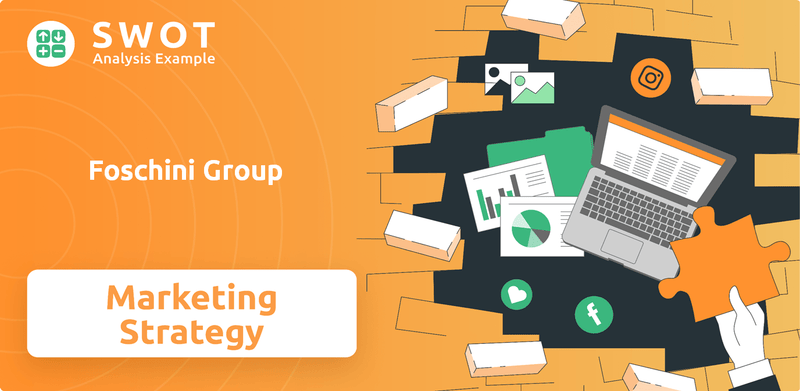
This analysis delves into TFG's impressive Foschini Group SWOT Analysis, focusing on its successful e-commerce platform, Bash, and its impact on the company's overall financial performance. We'll dissect TFG's approach to Retail Strategy South Africa, examining its Foschini Group Sales Strategy and Foschini Group Marketing Strategy within the competitive South African Retail Market. Furthermore, we will explore the Foschini Group Business Model and how it leverages its brand portfolio, strategic acquisitions, and digital prowess to drive sustainable growth and maintain its market leadership.
How Does Foschini Group Reach Its Customers?
The Foschini Group (TFG) employs a multifaceted sales strategy, leveraging both physical stores and digital platforms to reach its diverse customer base. This approach is central to its overall Foschini Group Business Model, ensuring accessibility and convenience for shoppers. The company's Foschini Group Marketing Strategy is deeply intertwined with its sales channels, aiming to create a seamless shopping experience across all touchpoints.
TFG's strategy focuses on integrating online and offline channels to enhance customer engagement and drive sales. This omnichannel retail strategy allows customers to interact with the brand in various ways, whether through physical stores or digital platforms. The company's ability to adapt and evolve its sales channels is crucial for maintaining its competitive position in the dynamic South African Retail Market and beyond.
As of March 2025, TFG operated 4,923 stores across 23 countries, demonstrating a significant physical retail presence. TFG Africa alone plans to open over 100 new stores in the 2026 financial year while continuously optimizing its existing store portfolio.
TFG's extensive network of physical stores forms a cornerstone of its sales strategy. This includes a substantial presence in South Africa, other African nations, the UK, and Australia. The company's strategy involves continuous evaluation and rationalization of its store portfolio to optimize return on capital employed.
The evolution of TFG's sales channels has seen a strategic shift towards digital adoption and omnichannel integration. The Bash e-commerce platform, launched in March 2023, is a cornerstone of this strategy, consolidating 15 separate brand websites into a single app and web-driven platform. This integration is key to the Foschini Group Sales Strategy.
The Bash e-commerce platform is a key driver of online sales growth for TFG. The platform has demonstrated significant growth, contributing 5.8% to total TFG Africa sales in FY2025, up from 4.2% in FY2024. Group online sales increased by 43.5% in FY2025, now accounting for 12% of total group sales.
Key partnerships and acquisitions also play a crucial role in TFG's sales channel strategy. The acquisition of White Stuff in October 2024 significantly boosted TFG London's sales by 16.4% in GBP. TFG leverages its in-house credit offering, which, along with cash sales, contributes to its revenue generation.
TFG's approach to sales channels involves a blend of physical and digital platforms, strategic acquisitions, and innovative technologies. The company’s investment in centralized fulfillment, including the state-of-the-art Riverfields Distribution Centre commissioned in September 2024, supports efficient transport to both stores and e-commerce, aiming for 70% central fulfillment of e-commerce orders. This is a key component of its Retail Strategy South Africa.
- Physical Retail: A vast network of stores across multiple countries.
- Digital Platforms: The Bash e-commerce platform driving online sales.
- Omnichannel Integration: Rollout of Bash-powered in-store technology to enhance the customer experience.
- Strategic Partnerships: Acquisitions like White Stuff boosting sales.
- Efficient Logistics: Centralized fulfillment centers to support both store and e-commerce sales.
Foschini Group SWOT Analysis
- Complete SWOT Breakdown
- Fully Customizable
- Editable in Excel & Word
- Professional Formatting
- Investor-Ready Format
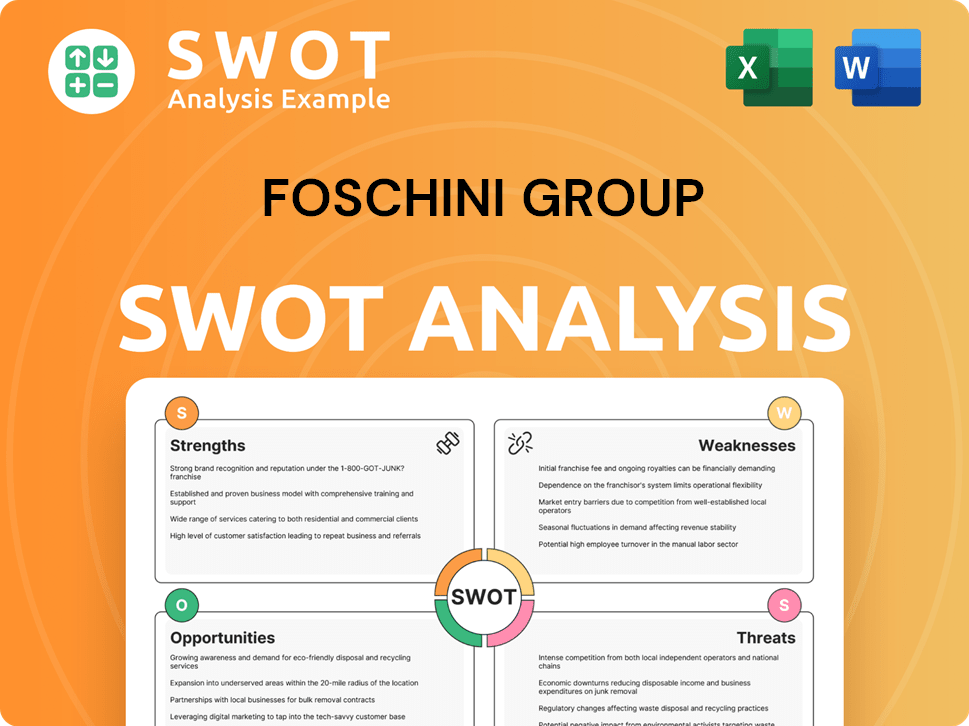
What Marketing Tactics Does Foschini Group Use?
The company, now known as TFG, employs a multifaceted approach to marketing, blending digital and traditional methods to boost brand recognition, generate leads, and increase sales. The core of its digital strategy revolves around the Bash e-commerce platform, leveraging its extensive customer base to provide market access for its brands. This strategy focuses on faster delivery and reliable logistics, a key differentiator in the competitive e-commerce landscape.
Data-driven marketing, customer segmentation, and personalization are central to TFG's strategy. Loyalty programs, such as 'TFG Rewards & More' (TFGRM) and 'My TFG World Reward' (MTFGWR), are designed to enhance customer engagement through instant, personalized rewards. This approach aims to tailor product recommendations and promotions to drive engagement and conversion, leveraging customer data effectively.
While digital advancements are prominent, TFG also utilizes traditional media and events. The company's commitment to sustainability, exemplified by its Sustainable Design Incubator program, also serves as a marketing tool. Furthermore, its focus on domestic production, with a significant percentage of apparel manufactured within the Southern African Development Community, reinforces its commitment to local markets and sustainability.
The Bash e-commerce platform is a central hub for TFG's digital marketing efforts, providing market access to its brands. The platform's rapid growth, with over 3.8 million app downloads since March 2023, highlights its success. TFG competes with global e-commerce players by emphasizing faster delivery and reliable logistics.
Data-driven marketing, customer segmentation, and personalization are key elements. Loyalty programs like 'TFG Rewards & More' and 'My TFG World Reward' offer instant, personalized rewards. TFG aims to tailor product recommendations and promotions to drive engagement and conversion.
TFG Rewards won two awards in April 2024 for 'Loyalty Redefined' and 'Best Use of Technology'. Program satisfaction is critical for retention, emphasizing rewarding experiences. Personalized rewards had minimal impact in one study, but overall satisfaction was prioritized.
TFG also utilizes traditional media and events, though recent information primarily highlights its digital advancements. Sustainability initiatives, like the Sustainable Design Incubator launched in October 2023, also serve as marketing tools. This approach contributes to brand perception.
The company's commitment to sustainability is demonstrated by its Sustainable Design Incubator program. TFG's focus on domestic production, with 79.2% of TFG Africa's apparel manufactured in the Southern African Development Community, reinforces its local commitment. This strategy appeals to environmentally conscious consumers.
The e-commerce strategy is centered around the Bash platform, which is designed to compete with global players. Key differentiators include faster delivery and reliable logistics. The company aims to leverage customer data to deliver personalized experiences, tailoring product recommendations and promotions to drive engagement and conversion. For more information about its competitors, check out the Competitors Landscape of Foschini Group.
TFG's marketing tactics are designed to build brand awareness, generate leads, and drive sales through a blend of digital and traditional channels. The focus is on data-driven insights and customer-centric strategies to enhance engagement and loyalty.
- Digital marketing through the Bash e-commerce platform, emphasizing rapid growth and competitive advantages.
- Data-driven marketing strategies, including customer segmentation and personalization, to improve the customer experience.
- Loyalty programs that offer personalized rewards and focus on overall program satisfaction.
- Utilization of traditional media and events, alongside a commitment to sustainability.
- Emphasis on domestic production to reinforce local commitment and sustainability efforts.
Foschini Group PESTLE Analysis
- Covers All 6 PESTLE Categories
- No Research Needed – Save Hours of Work
- Built by Experts, Trusted by Consultants
- Instant Download, Ready to Use
- 100% Editable, Fully Customizable
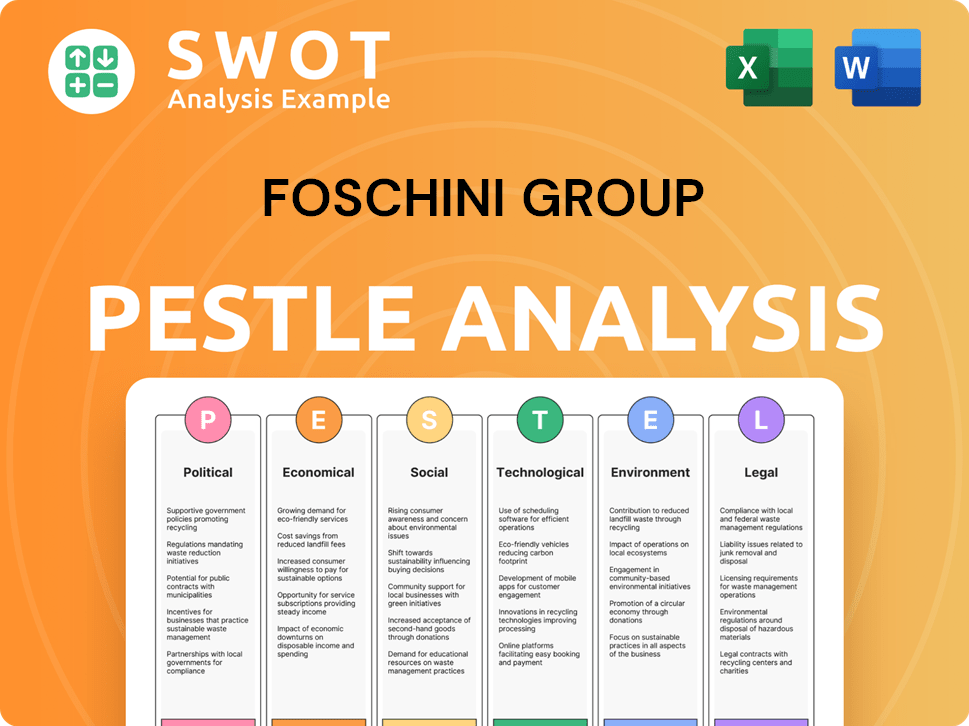
How Is Foschini Group Positioned in the Market?
The Foschini Group (TFG) strategically positions itself as a leading fashion and lifestyle retailer in Africa. This positioning is crucial for its Foschini Group Sales Strategy and overall business success. Their mission focuses on providing innovative products, exceptional customer experiences, and sustainable value creation, guiding all strategic decisions.
TFG differentiates itself through a multi-brand approach, offering a wide range of products across clothing, jewelry, and homeware. This strategy allows them to cater to diverse customer segments within the South African Retail Market. This approach supports its Foschini Group Marketing Strategy by enabling targeted campaigns and promotions across various brands.
The core of TFG's brand identity is being at the forefront of fashion retail, constantly innovating to meet evolving customer needs. Their visual identity and tone of voice are designed to build long-term relationships and foster a loyal customer base, emphasizing customer experiences. This is supported by its reputation for high-quality products and excellent customer service. For more insights, you can explore the Brief History of Foschini Group.
TFG's diverse brand portfolio caters to various customer segments, ensuring a broad market reach. This includes brands across clothing, jewelry, and homeware. This strategy supports their Retail Strategy South Africa by providing options for different tastes and budgets.
TFG actively focuses on sustainability, particularly in diverting textile waste and promoting reusable shopping bags. These initiatives resonate with consumers who prioritize ESG criteria. These efforts are a key part of their Foschini Group Business Model.
TFG Rewards plays a significant role in fostering customer loyalty and enhancing brand equity. These programs encourage repeat purchases and build stronger customer relationships. This is a key element in their Foschini Group Customer Relationship Management.
TFG's omnichannel strategy, particularly the integration of its digital platform, Bash, with physical stores, ensures a unified customer experience. This integration supports their Foschini Group Omnichannel Retail Strategy. This allows for seamless shopping experiences.
TFG actively responds to shifts in consumer sentiment and competitive threats by continuously introducing new products and adapting its strategies. In response to new international e-commerce entrants, TFG emphasizes its faster delivery times and established logistics network as key differentiators. This is a crucial element of their Fashion Retail Marketing.
- Faster Delivery: TFG leverages its established logistics network to offer quicker delivery times compared to some international competitors.
- Established Logistics: Their robust supply chain is a key advantage.
- Brand Adaptability: TFG continuously introduces new products and adapts its strategies to meet changing customer needs and competitive pressures.
- Customer Experience: Prioritizing customer experience is central to their brand positioning.
Foschini Group Business Model Canvas
- Complete 9-Block Business Model Canvas
- Effortlessly Communicate Your Business Strategy
- Investor-Ready BMC Format
- 100% Editable and Customizable
- Clear and Structured Layout
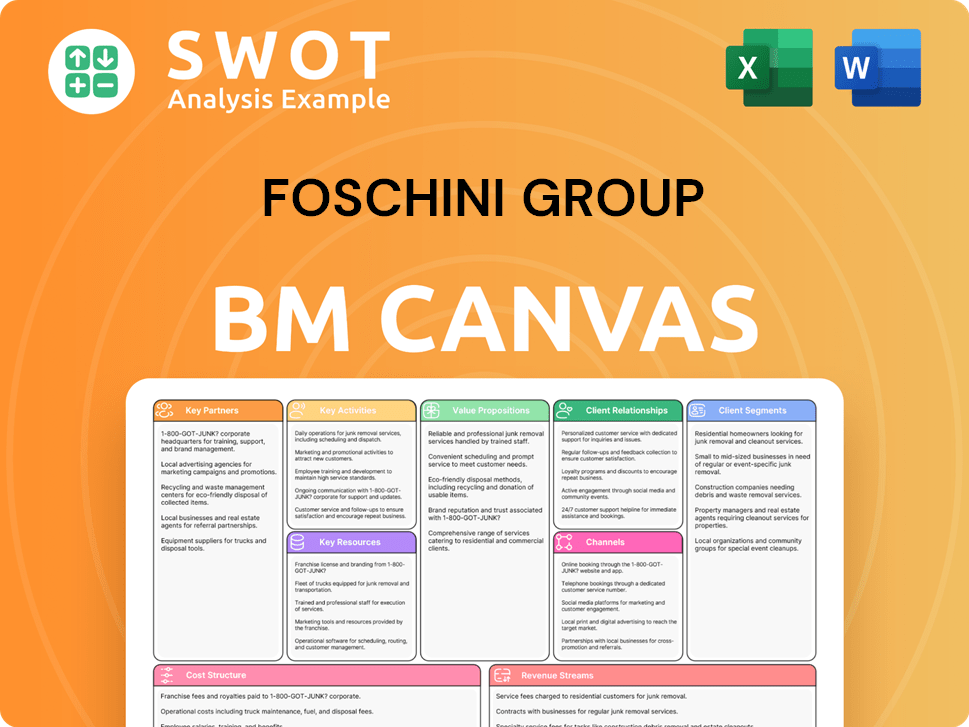
What Are Foschini Group’s Most Notable Campaigns?
The sales and marketing strategies of The Foschini Group (TFG) are multifaceted, focusing on digital expansion, physical store optimization, and customer loyalty. Key campaigns drive these strategies, aiming to enhance market presence, customer engagement, and financial performance. These initiatives are crucial for navigating the competitive South African retail market and achieving sustainable growth. Understanding these campaigns provides insight into TFG's approach to staying relevant and profitable.
A significant portion of TFG's strategy revolves around its digital platforms. The launch and growth of Bash, its e-commerce platform, exemplify this focus. Simultaneously, TFG continues to invest in its physical retail footprint, opening new stores and optimizing existing ones. These efforts are complemented by customer-centric programs, such as loyalty schemes and sustainability initiatives, to build brand loyalty and reflect evolving consumer preferences.
These campaigns are not isolated but are integrated to create a cohesive retail experience. The company's commitment to innovation and adaptation is evident in its strategic moves, from e-commerce to sustainability, positioning it for future success. For a deeper dive, you can explore the Growth Strategy of Foschini Group.
Launched in March 2023, Bash has been a pivotal element in TFG's digital strategy. The platform has significantly boosted online sales, with a 43.5% growth in FY2025. Bash contributed 12% to the total group revenue, demonstrating its importance. The focus is on convenience and speed, with 59% of parcels delivered in under 48 hours at a 34% lower cost.
TFG plans to open over 100 new stores in the 2026 financial year. This initiative aims to enhance return on capital employed. The acquisition of White Stuff in October 2024 for TFG London is another strategic move, designed to diversify and strengthen its womenswear portfolio.
TFG Rewards has been a focus for enhancing customer retention. In April 2024, TFG Rewards won two International Loyalty Awards. These campaigns aim to build a loyal customer base through personalized and experiential rewards, driving customer engagement.
Launched in October 2023, this program supports sustainable fashion practices. It boosts brand visibility and credibility. Designers' ranges are launched on Bash, providing access to TFG's extensive customer base. This campaign aligns with consumer demand for ethical practices.
Foschini Group Porter's Five Forces Analysis
- Covers All 5 Competitive Forces in Detail
- Structured for Consultants, Students, and Founders
- 100% Editable in Microsoft Word & Excel
- Instant Digital Download – Use Immediately
- Compatible with Mac & PC – Fully Unlocked
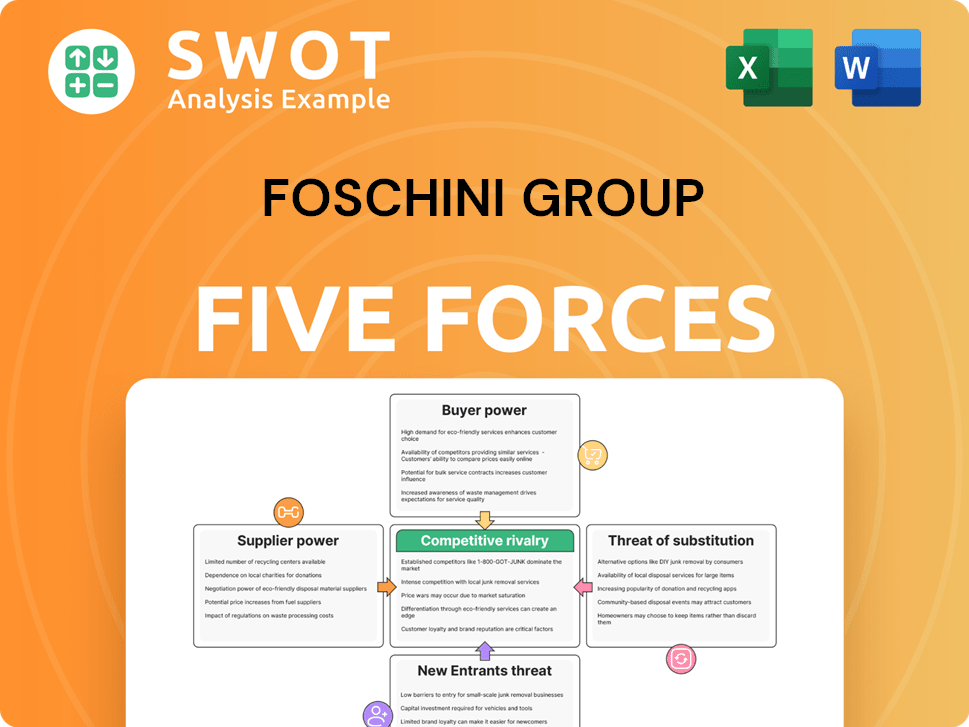
Related Blogs
- What are Mission Vision & Core Values of Foschini Group Company?
- What is Competitive Landscape of Foschini Group Company?
- What is Growth Strategy and Future Prospects of Foschini Group Company?
- How Does Foschini Group Company Work?
- What is Brief History of Foschini Group Company?
- Who Owns Foschini Group Company?
- What is Customer Demographics and Target Market of Foschini Group Company?
Disclaimer
All information, articles, and product details provided on this website are for general informational and educational purposes only. We do not claim any ownership over, nor do we intend to infringe upon, any trademarks, copyrights, logos, brand names, or other intellectual property mentioned or depicted on this site. Such intellectual property remains the property of its respective owners, and any references here are made solely for identification or informational purposes, without implying any affiliation, endorsement, or partnership.
We make no representations or warranties, express or implied, regarding the accuracy, completeness, or suitability of any content or products presented. Nothing on this website should be construed as legal, tax, investment, financial, medical, or other professional advice. In addition, no part of this site—including articles or product references—constitutes a solicitation, recommendation, endorsement, advertisement, or offer to buy or sell any securities, franchises, or other financial instruments, particularly in jurisdictions where such activity would be unlawful.
All content is of a general nature and may not address the specific circumstances of any individual or entity. It is not a substitute for professional advice or services. Any actions you take based on the information provided here are strictly at your own risk. You accept full responsibility for any decisions or outcomes arising from your use of this website and agree to release us from any liability in connection with your use of, or reliance upon, the content or products found herein.